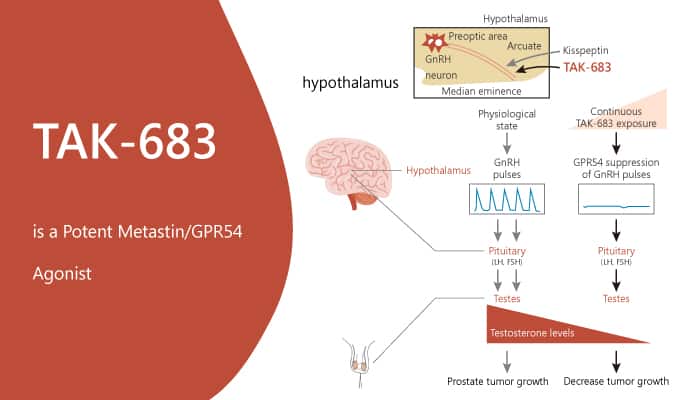Metastin/kisspeptin is a 54 amino acid peptide from human placental tissues. It is also the ligand of an orphan G protein-coupled receptor GPR54. GPR54, the KISS1 gene encodes the KISS1 receptor (KISS1R) and expresses in the rodent and human placenta and brain.
In this article, we will introduce a KISS1 receptor (KISS1R) agonist, TAK-683.
TAK-683, as a potent and full KISS1 receptor (KISS1R) agonist, has improved metabolic stability. Besides, TAK-683 is a nonapeptide metastin analog. it exhibits agonistic activities to KISS1R with EC50 values of 0.96 nM and 1.6 nM for human and rat, respectively.
In vitro Ca+ mobilization assay, TAK-683 exhibits IC50 values (95% CI) from receptor binding assays is 150-180 pM. Besides it shows an EC50 value from this assay is 180 (159 – 203) pM in rat KISS1R-expressing Chinese hamster ovary (CHO) cells.

We will mainly describe its property in vivo.
Firstly, Pharmacokinetic parameters are conducted in IGS/SD rats. TAK-683 at dose 1 mg/kg by intravenous and subcutaneous injection shows different values. Mean pharmacokinetic variable estimates of TAK-683 exhibit as follows: C5min, 2509 ng/mL; Vdss, 1225 mL/kg; and CLtotal, 819 mL/(h·kg).
Nextly, In a 1-week study, 10 pmol/h dosing of TAK-683 does not attenuate testosterone concentrations in all rats. However, TAK-683 can suppress plasma testosterone in rats at lower doses with 4-week administration. It provides a promising for suppressing reproductive functions and hormone-related diseases such as prostate cancer.
Lastly, in a JDCaP prostate tumor rat model. TAK-683 (s.c. infusion; 1.4 or 7 nmol/kg/day; 50 days) reduces serum concentrations of PSA in all rats. On day 14, TAK-683 reduces to the limit of detection (0.5 ng/ml) in the rat. TAK-683 has anti-tumor activity and in vivo.
In conclusion, Tak-683, as a potent kisspeptin analog, it depletes GnRH in the hypothalamus and reduces plasma FSH, LH, and testosterone levels in vivo. Moreover, chronic administration of Tak-683 provides a promise as a novel therapeutic approach for suppressing reproductive functions and hormone-related diseases. TAK-683 will capture more attention for its anti-tumor activity.
Reference:
Hisanori MATSUI, et al. Functional Analyses of Kisspeptin in Controlling Gonadal Functions